The 3 Biggest Mistakes You’re Making with Your Google Advertising
Updated on July 15, 2021Did you know that Google has just over 1 million business customers worldwide?
How can that be, when there are more than 28 million small businesses in the United States alone?
I know how!
Google advertising (also known as pay per click or PPC) is complicated!
If you don’t know what you’re doing, it’s easy to waste A LOT of money. So unless you’re an expert (or have one on staff), you need to know the basics — stat.
Read on for three common — and costly — PPC mistakes I see small business owners make…
Pay per click is a wonderful tool, don’t get me wrong.
Here at PostcardMania, we get 500-600 new PPC leads a week.
But there are so many moving parts — it takes a lot of testing, trial and error, which is why we paid another firm to manage our PPC back in the day.
Then I hired a young man to work with the firm so we could more closely monitor what they were doing. Over time he learned the ins and outs of PPC and was managing our campaigns BETTER than the firm we had hired!
Now we handle all of our PPC campaigns in-house (our clients’ campaigns, too). Okay – enough of a plug about us… this is about tips for YOU.
Many small business owners try out PPC — throw maybe $500 at it to see if it works — and boom! That money is gone. Most receive barely a few leads (if any), and there are those that get plenty of leads but no new business to show for it. (This usually means that your leads aren’t that qualified to begin with, by the way.)
Then what? They throw up their hands and say FORGET IT!
I get it, but:
I also know that done right, PPC gets GREAT results. That’s why I spend $20,000 on it every single week!
According to Search Engine Journal, 93% of online experiences begin with a search engine. That’s a whole lot of missed opportunities if you’re not doing any PPC advertising.
So without any further ado, here are the 3 biggest mistakes I see small business owners make with PPC — and how to fix them so you can get the results you need for your business!
1.) You’re sending prospects from your ad to your home page.
Say you’re running a PPC ad promoting a great deal on a particular piece of jewelry — for example, a heart-shaped pendant. Your prospect clicks on the ad and it takes her to your homepage, where there’s no sign of the pendant.
Then what? She has to dig around to find what she was looking for — information that you promised with that ad!
If — and that’s a big IF — she does go to the trouble of poking around your site for the pendant, each moment that she spends searching, she is getting more frustrated and less likely to BUY.
But this is what will probably happen:
She’s just going to think the ad misled her, be annoyed, and click away!
Every one of your ads should click through to a coordinating landing page that continues the conversation started by the ad (or, if you’re promoting a particular item, that item’s product page — with the option TO BUY).
GOOD EXAMPLE:
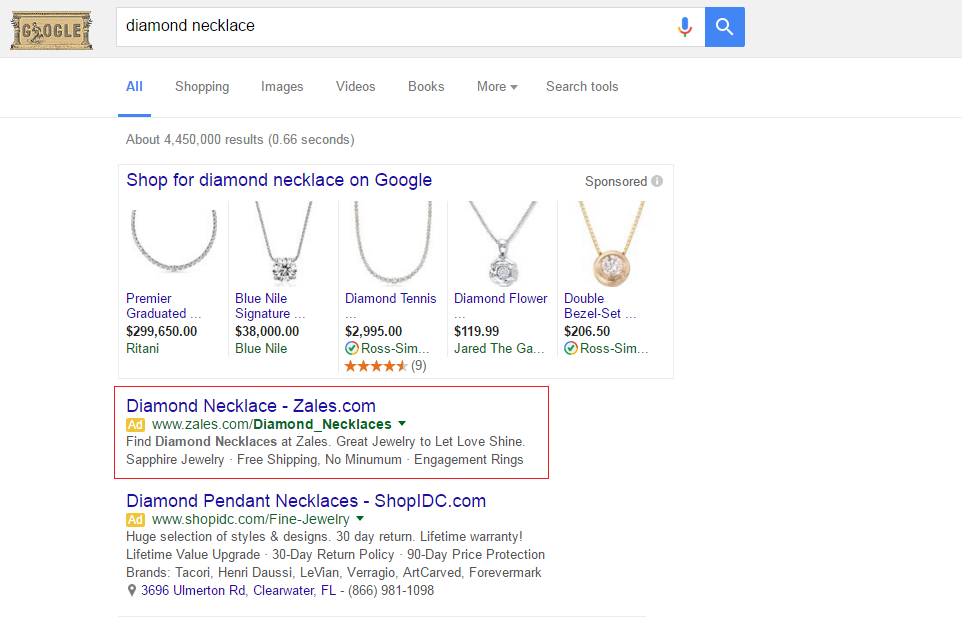
Click on the ad and it takes you to:
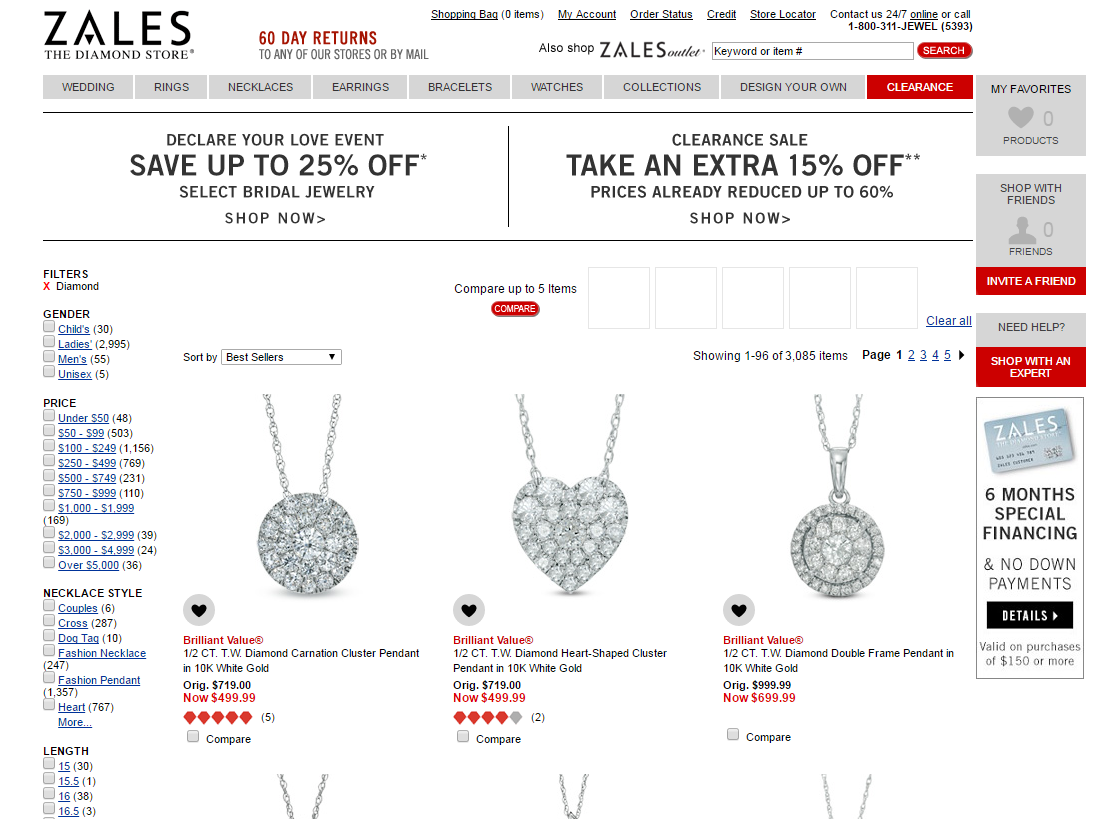
Diamond necklaces! Ding ding!
BAD EXAMPLE:
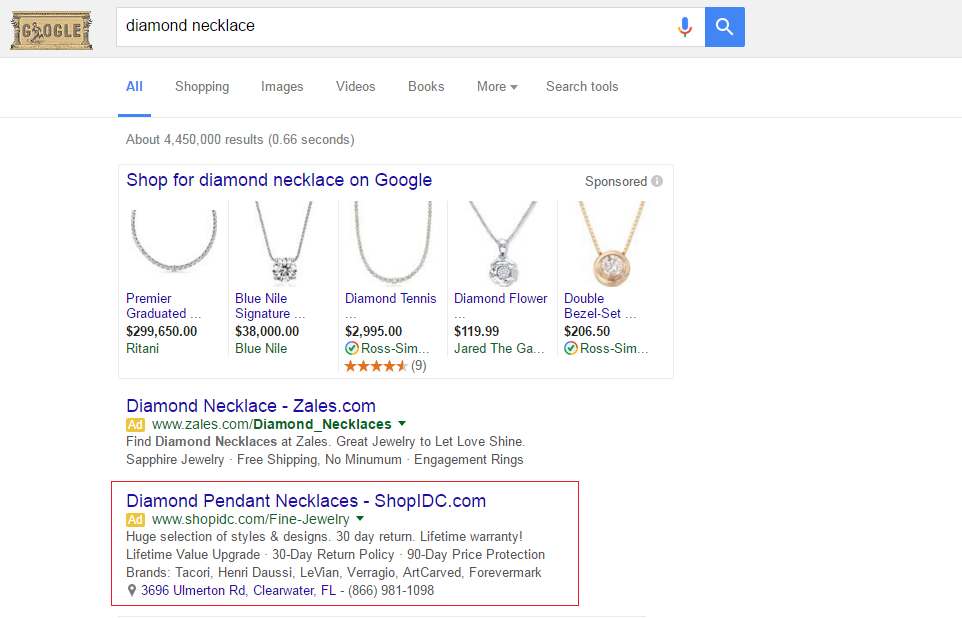
Click on the ad and it takes you to:
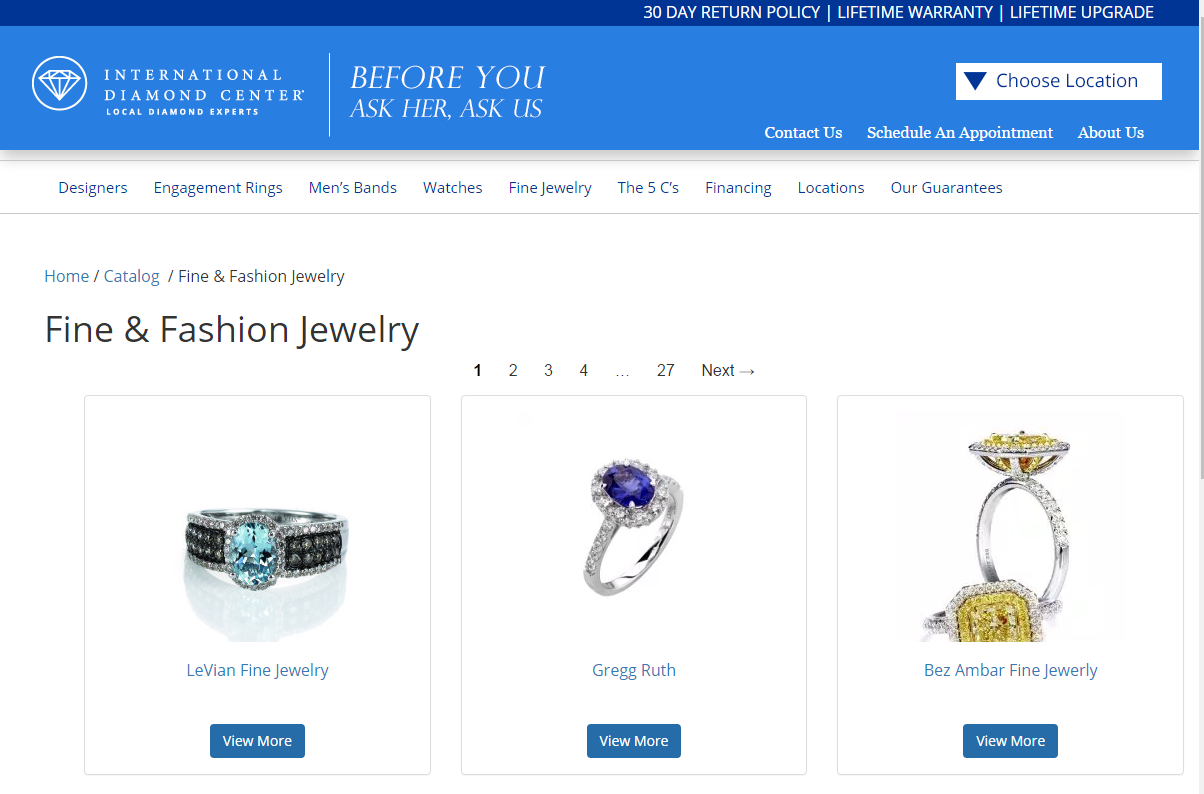
Not at all what you were looking for, is it?
2.) You’re not using negative keywords.
What the heck is that?
Keep reading…. I’ll explain; I promise…
A popular tip I hear is to not bid too broadly.
Meaning that the more specific the keywords you bid on, the better. So for example:
- “1 carat diamond stud earrings” is better than
- “diamond earrings” is better than
- “diamonds” etc.
However, exclusively targeting long-tail keywords (which are keywords containing three, four or more words) could be hurting your PPC campaign.
Let me explain:
Let’s stick with the jewelry example for a moment. Say you design beautiful, high-end pendant necklaces, and you bid on the keyword “jewelry.” Yeah, a lot of people conducting that search will not be qualified prospects. But many of them will be!
You have to find a way to weed out those that aren’t.
A great way to do that is:
Include negative keywords in your campaigns!
Think about the words people might include in their search that would make them an unqualified prospect.
Would someone searching for “free jewelry” make a good lead? Well, since they’re looking for something FREE, I’d say not! Or even someone searching for “cheap jewelry.” What about someone searching for “costume jewelry?” The list goes on and on.
So to start, you’ve got “free,” “cheap” and “costume” as negative keywords.
Here’s how you would exclude them in your AdWords account:
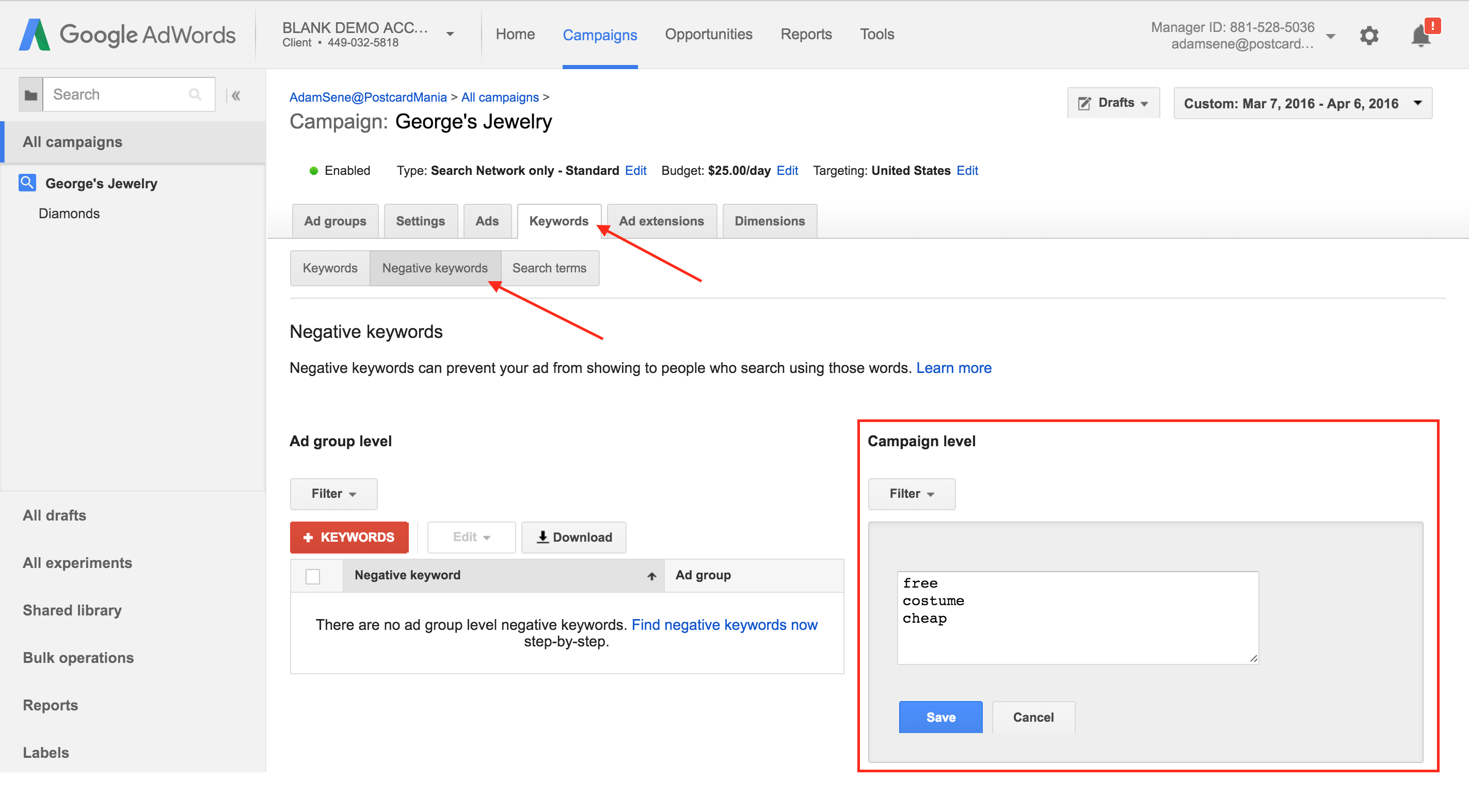
It’s as easy as selecting “Keywords,” then “Negative keywords” and then saving your changes!
There are literally a million more possibilities — get creative! Are people who are looking for BOOKS about jewelry going to buy from you? What about people looking for ESTATE jewelry? What about people looking for information about the MUSEUM of Jewelry in San Francisco?
Negative keywords cost you NOTHING to add. But every good negative keyword potentially saves you from paying for an unqualified click!
As the weeks and months pass, you can see what searches led people to your ad who did not convert (or even click), and start adding those words to your negative keyword list!
3.) You’re not testing and tweaking.
What’s brilliant about PPC is that you can see exactly how your ads are performing and constantly adjust and improve them.
If you’re not taking advantage of this, you’re not getting the kind of results you CAN and SHOULD be getting!
And make sure you’re not JUST looking at how many people click on your ad, but how many of those people are actually BUYING. If you put the word FREE in your ad, you’ll get a ton of clicks and possibly leads too — but they may not be interested in forking over their money anytime soon.
Test a couple of different ads against each other to see which does best. This is called a split test. More specifically, a split test is when you directly measure the results of one campaign against a nearly identical campaign.
Both campaigns should be the same except for ONE variable. Here’s an example:
Ad A:

Ad B:

Whichever campaign creates the most leads and sales is the winner, and that way you’ll know that the tested variable directly leads to higher sales.
When you can see which ad is clearly performing better, kill the other one and start a new test!
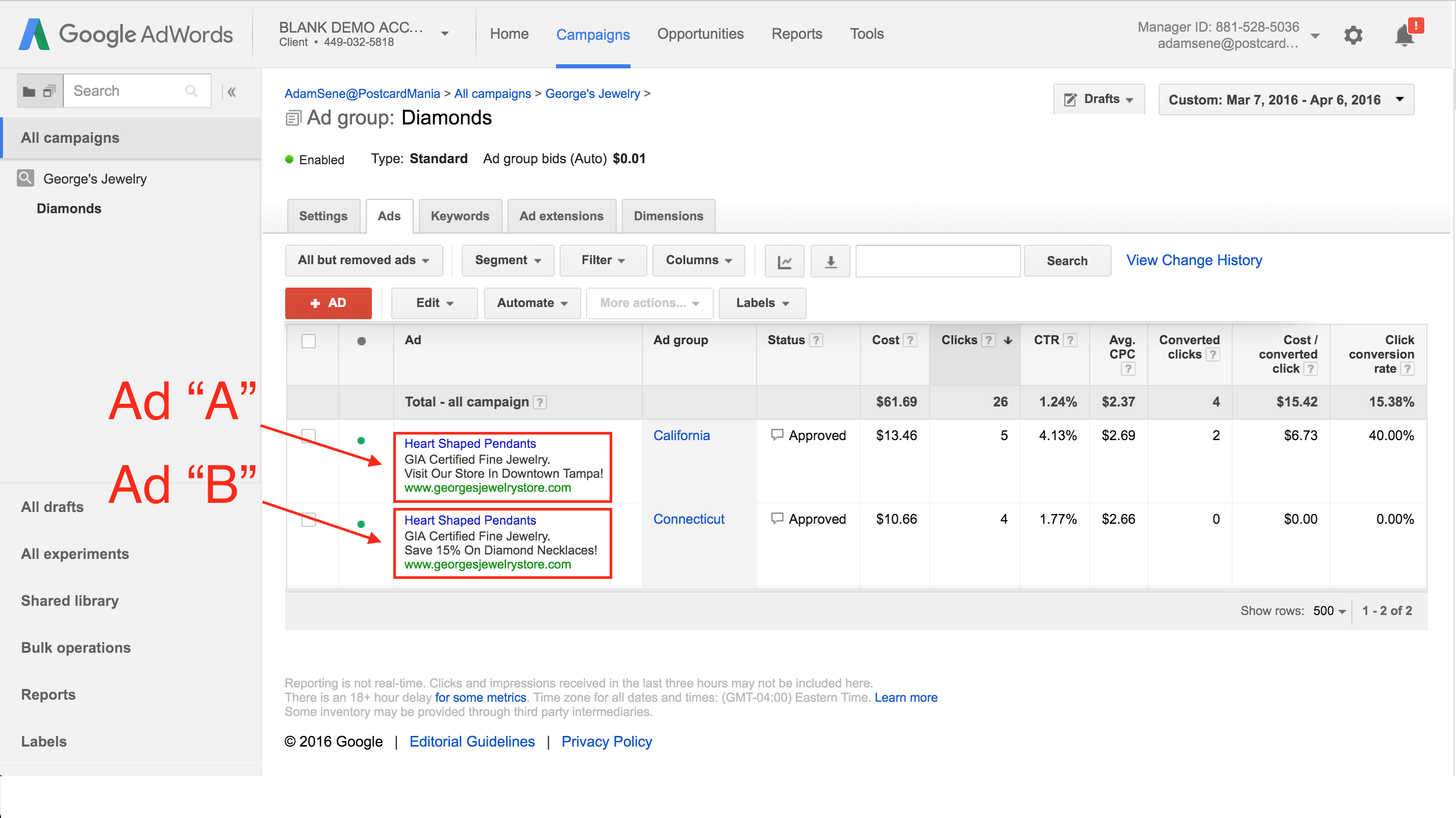
I know — it’s a LOT of work. You could literally make a full-time job of it.
So it’s hard to imagine how a busy small business owner could find the time to manage an effective PPC campaign. That’s why I strongly recommend hiring someone — whether it’s an outside agency or someone in-house — to run yours.
I have a whole team of experts who manage our clients’ PPC campaigns. They can:
- Set up a laser-focused PPC campaign for your business
- Research your competitors and industry keywords
- Split-test your ad copy
- Adjust bids to ensure maximum profitability
- Send you monthly reports with all your results
Our PPC management services are affordably priced for small business owners and are based on how detailed and aggressive your campaign is. Give us a call today at 1-800-628-1804 and we can talk about building a cost-effective PPC campaign that works for your business!
Best,
Joy

30 Comments
So glad you like it! Thanks for taking the time to visit my blog, Mary Lou. 🙂
Thank you,
You’re welcome!
I’m a SEO ignoramus lol, that said I really liked the educational value of the article. Now I’m motivated to look into poc more deeply for my plumbing company.
I’m so glad I was able to motivate you into looking into SEO more. It’s such a great marketing tool!
Really great advice! These simple tips can make all the different in PPC success.
Thanks, Jill!
Great advise.
Thank you, Maria!





Enjoyed the article. Good advice particularly the negative keywords.